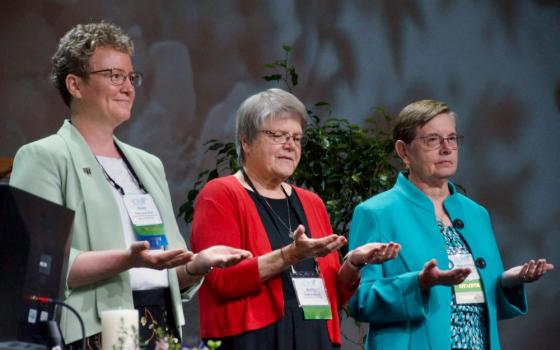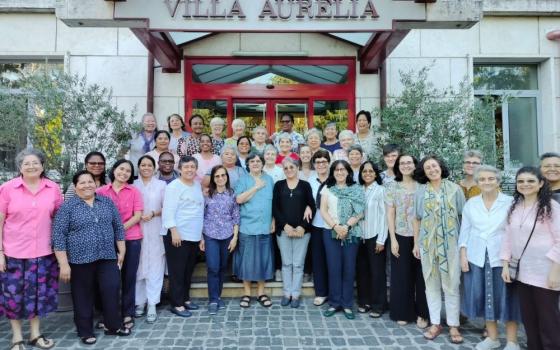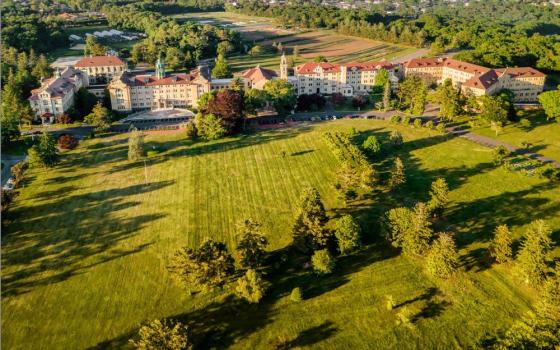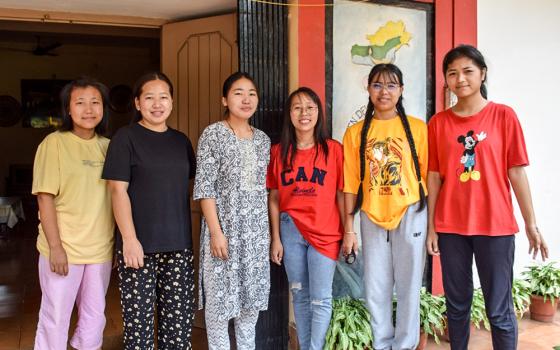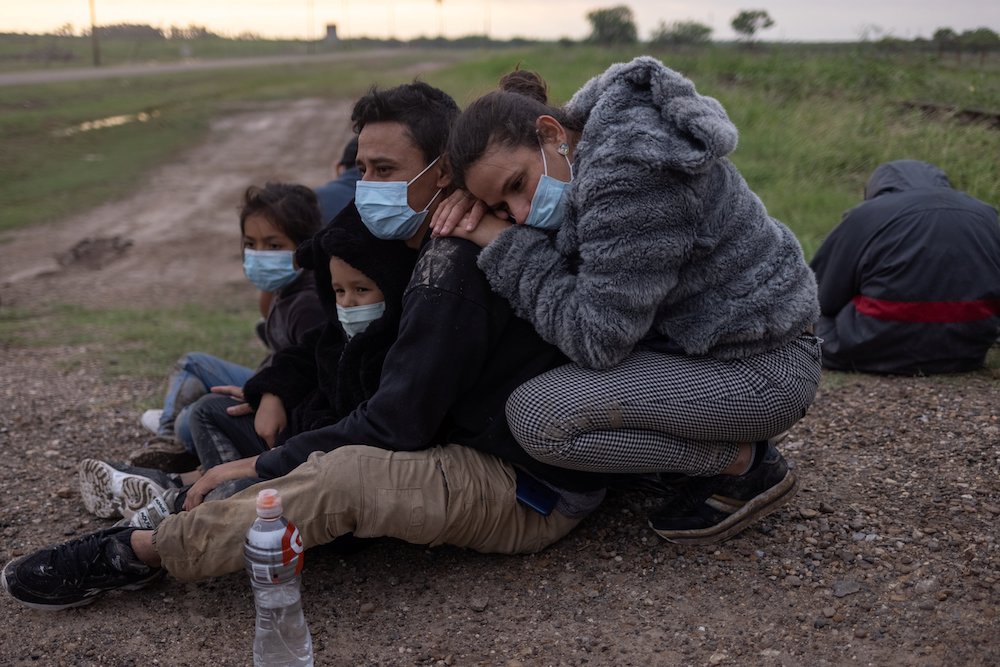
A migrant family from Nicaragua seeking asylum in the U.S. waits to be transported to a Border Patrol processing facility after crossing the Rio Grande into La Joya, Texas, May 13, 2021. (CNS/Reuters/Adrees Latif)
Global Sisters Report requested reports from sisters who have been volunteering at the U.S.-Mexico border in response to the humanitarian crisis there. This is the first of those reports chosen for publication. Submissions are edited for length and clarity.
Sr. Kristin Peters of the Franciscan Sisters of Perpetual Adoration traveled to Arizona, where she ministered with Casa Alitas, the Kino Border Initiative and the Tucson Samaritans, who help migrants braving the desert to cross from Mexico into the United States. She reports here on her time with the Tucson Samaritans:
When we travel with Christine of the Tucson Samaritans into the desert, she implores us to please, please tell people what the border wall has done. She asks that we show them and tell them the damage that it has caused.
Into a 4x4 vehicle we pack gallon jugs of water, a backpack filled with water and food, and Samaritan signs for the truck. Though it is unlikely, she tells us if we meet a migrant, we will offer the bag and talk with the person about what they need. The migrant may want to give up the journey or continue. They make their own decision; we do not influence them.
The Tucson Samaritans are volunteers who put water into the desert and educate groups who come to Tucson to learn about the border. The Jeep we travel in is named Joe, after former county sheriff Joe Arpaio, who was particularly inhumane in his treatment toward immigrants. Proceeds from a U.S. Justice Department civil rights lawsuit against Arpaio's office benefited community groups that support immigrants; the Jeep named for Arpaio was paid for by the settlement.
Christine says 258 people have died this year in the desert. I understand over the last 10 years, there have been almost 6,000 deaths in the desert.
As we drive, Christine notes that migrants walk along this road hoping someone their coyotes have paid will pick them up. We pull over at a mile marker indicating 38 miles from the border checkpoint. There is a cross. We stand in solidarity, acknowledging the effects of the border wall and the severity of our immigration policy. I ask Christine why she does this work with Tucson Samaritans. She says she knows what it is like to be thirsty when hiking in the desert; it is a humanitarian thing.
She adds that the United States has signed on to international law, which allows people to come to your border to ask for asylum. Given the number of families sending their children alone, it seems we are truly only giving children a chance for refuge. She and others I have met report that men are often separated from their families, put in detention or returned to distant border towns.
We return to the truck and head toward the border wall. The stories unravel as we drive. As Christine shares, I remember Diego, who works at Casa Alitas. He described the organization as grassroots and volunteer-led. He shares this in a way that is touching, noting that it is the community volunteers who are truly the ones who make the difference. When I asked Diego why he does this work, he asked me what I would do if it were my family.
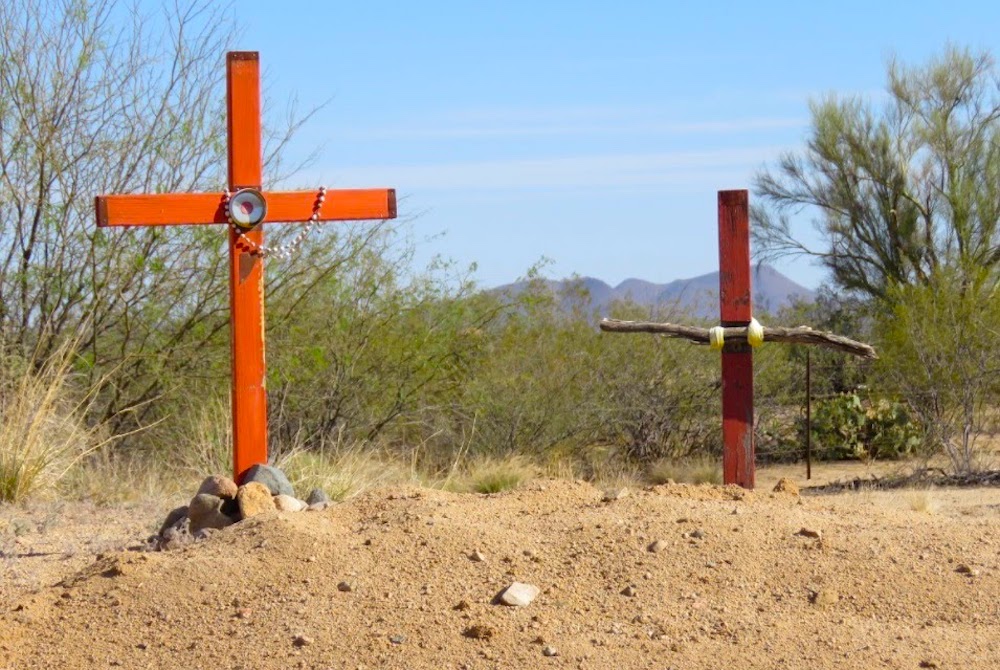
Tucson Samaritans and others place crosses at sites where migrants' bodies are found in the Arizona desert. An estimated 258 people have died so far this year trying to cross the border from Mexico into the United States. (Courtesy of the Franciscan Sisters of Perpetual Adoration)
The wall comes to an end and begins again at various stops where the steel slats did not match. At the end of the wall, two water jugs are placed. I think in this way, we leave our mark. We then drive in the opposite direction, leaving jugs of water near where there are other gaps in the steel construction.
On this journey through the desert, I witnessed many who remain standing in solidarity, just as there are many who continue to seek a better life for their families in this country. Equally, I witness the many dreams lost in crossing the desert.
Near the end of our journey, at mile marker 19, we kneel and stand at the cross of an infant who was born and died in the crossing. We mark her life and her mother's life with our tears and our prayers. Through this encuentro, we walk away with our heart and conscience pricked. Hopefully, we are provoked with a clearer sense of mission and forthcoming action.
Mercy Sisters Peggy Verstege and Carmelita Hagan paused in the airport in Laredo, Texas, on their way back from the border to write a reflection, "Shoes for the Journey":
The young mothers and children come.
Young fathers come with children, too.
They come miles, believing that life will be better in this country.
They come tired but trusting us to help them go forward.
They come hungry and hot.
They come each day.
Most need clothes.
Many need shoes for the journey.
Each day is busy, busy ... Long and hot ... Sometimes chaotic ... but real.
¿Tiene camiseta? ¿Pantalones? ¿Zapatos? [Do you have a T-shirt? Jeans? Shoes?]
¿Bolsa? ¿Banar? ¿Por favor? Yo tengo hambre. ¿Comida? ¿Agua? Por favor [Bag? Bath? Please? I am hungry. Food? Water? Please]
They wait in line to be processed.
They wait for food, clothing, and a place to sleep.
They wait with patience in the Texas heat.
They live in hope, a precious thread for life.
What more must we be and do for the journey?
Will the seekers be welcomed?
We can only hope and act in love, prepare food, find water and get the clothes and shoes for their journey.
A Border Patrol agent near El Paso, Texas, plays a rock-throwing game with asylum-seeking migrants who crossed the Rio Grande from Mexico on May 14. (CNS/Reuters/Jose Luis Gonzalez)
Sr. Meg Earsley of the Franciscan Sisters of Perpetual Adoration also volunteered at Casa Alitas, the Kino Border Initiative and the Tucson Samaritans:
As I got off the plane in Tucson to begin my time volunteering at the border, I didn't know what to expect, but as the week went on, I couldn't help but wonder, more and more, about the inequity of our human existence depending on our geographical start and the courage of so many who try to find safety, peace and opportunity in our country.
I volunteered at Casa Alitas for much of my time in Arizona, helping to sort and find clothing for the residents there. Most residents spend just a few days at Casa Alitas, as they connect with their sponsors after requesting asylum. A steady stream of people from places like Honduras, Venezuela and Guatemala come through the welcoming center. Everyone gets a set of clothes when they arrive, as well as a meal and a safe place to sleep.
One of the first families I worked with was a younger father and his little girl. He was asking for a pair of pants and shoes for her. After a few tries, we were able to get her what she needed. Only after her needs were met did he ask for a pair of shoes for himself. I couldn't help but notice the ankle bracelet secured on his leg and wonder why we are criminalizing asylum-seekers in such a way instead of welcoming them.
The Kino Border Initiative is in Nogales on the Mexico side of the border, and we stopped by during our stay. It is a bright and inviting place that welcomes asylum-seekers with meals, temporary lodging and help with legal needs. Filling out the extensive paperwork to seek asylum can be overwhelming, even if one speaks English. The initiative provides daily classes as well as one-on-one time with attorneys to assist asylum-seekers with the process. Without the right documents, there is no entry into the United States.
While we were there, we met Jesús. He had been deported months earlier after being pulled over and found without a driver's license. We learned that Jesús had moved to the United States when he was 10 years old. After living in the United States for 35 years, he was expelled from the only home he knew, separated from his family and sent to Mexico, where he has no family or friends. Jesús waits alone, working with Kino Border Initiative attorneys to try to return home. His story touched me deeply, and I wondered why there is no path to citizenship for Jesús.
Toward the end of our time in Tucson, we were invited to ride along on a desert water run with the Tucson Samaritans. They leave water at locations in the desert, hoping to prevent the deaths of those crossing the desert in desperation to enter the safety of the United States. As we made our deliveries, we found evidence of empty water containers from desert travelers as well as scraps of fabric and torn backpacks from travelers.
I could barely contain my grief when we approached a cross on the side of the highway that memorialized a little baby. Little toys, a rattle, a Batman figurine and a St. Nicholas statue huddled with other items around the cross. We held a silent vigil, filling the quiet with prayers for the baby and for the unfairness of the plight of the mother who had to abandon her lifeless baby. In my mind, I saw my new baby grandnephew, who was born prematurely and received all the medical help he needed. I wondered what made him worthier of life than this little one?
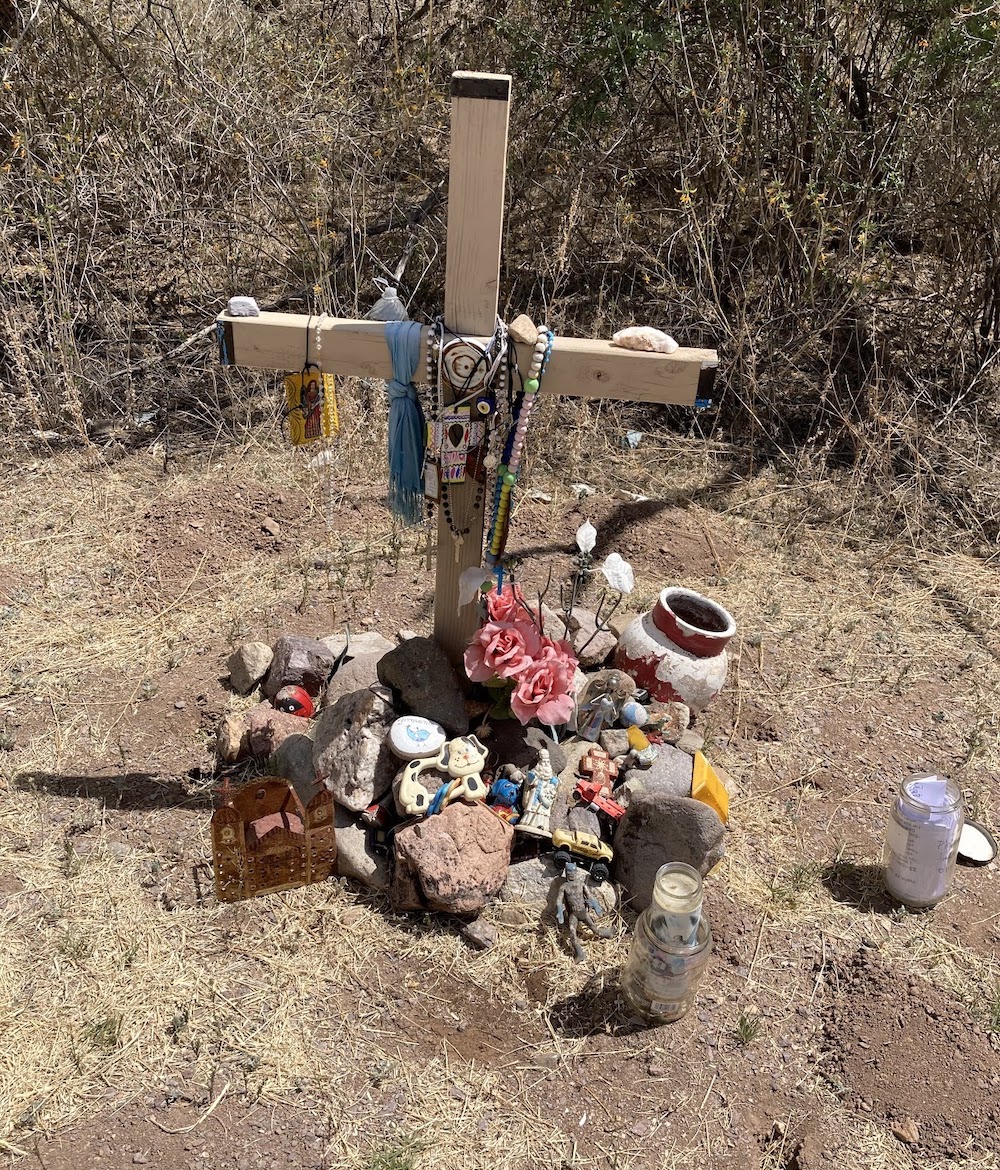
The grave of a baby, born while its mother was crossing the Arizona desert to migrate into the United States, is decorated with toys, mementos and prayers. An estimated 6,000 people have died trying to make the crossing in the last decade. (Courtesy of the Franciscan Sisters of Perpetual Adoration)
As I attended Mass last Sunday, the church was full of smiling faces. I noticed one of the parish's beloved little girls in the back of the church. She was helping to greet people entering the church and helped to drop their donations into a basket. As she did, she would come and go, prancing back and forth.
I was brought back to Casa Alitas, to another little girl who received a brand-new pair of shoes, the kind that light up when you walk. She smiled a great big smile, said "gracias" and did the same running dance out the door. In 2020, the asylum approval rate was only 28%, and I realized the little feet in those light-up shoes will likely return to a country where that happy little girl will not be safe.
What would it be like with more of our brothers and sisters from different places here, creating community in a new way and bringing the richness of their lives to our experiences?
—Sr. Meg Earsley
As I looked around and saw all the light-skinned people in the church community, I imagined what a beautiful place it would be if that little girl from Casa Alitas and her mom were there. What would it be like with more of our brothers and sisters from different places here, creating community in a new way and bringing the richness of their lives to our experiences?
The memories and imaginings from my border experience almost overwhelmed me while singing our Communion hymn, "Bread for the World" by Bernadette Farrell: "Where we are tired and weary, you are waiting there to be the way which beckons us beyond despair" and "Where we survive on others in our human greed, you walk among us, begging for your every need."
May we truly become bread for the world.
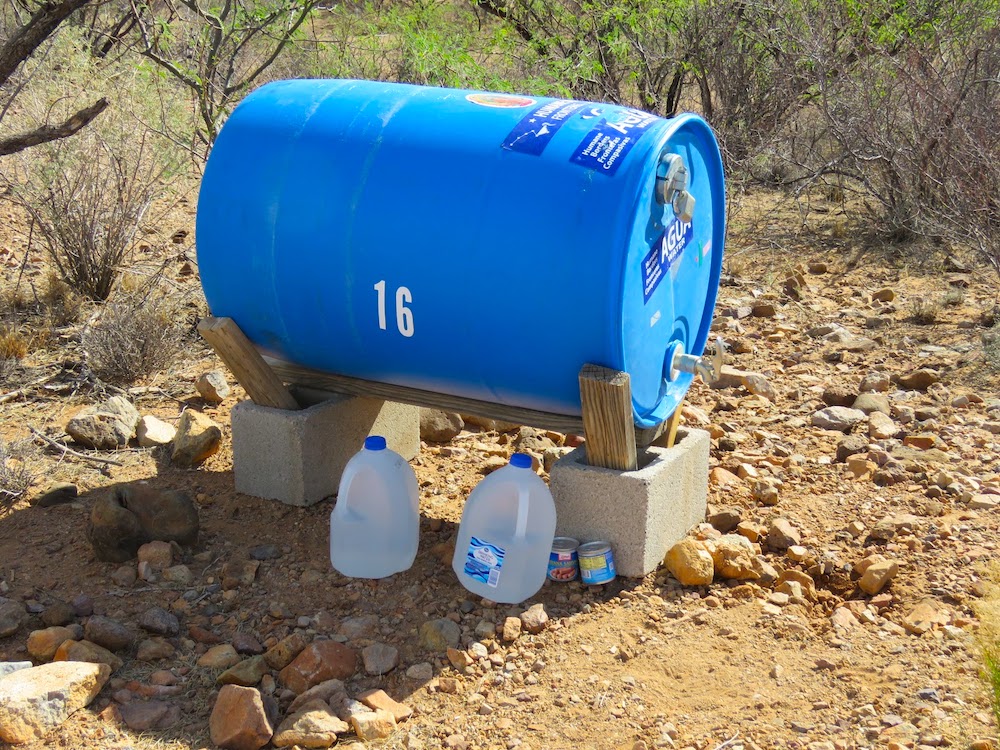
A barrel of water placed in the Arizona desert near the U.S.-Mexico border by Tucson Samaritans, a group that works to prevent migrant deaths in the area. (Courtesy of the Franciscan Sisters of Perpetual Adoration)
Sisters of Mercy Patricia Mulderick and Theresa Saetta ministered in the Rio Grande Valley. Mulderick wrote about their time there:
I arrived in the Rio Grande Valley in January to work at ARISE, a center of support and advocacy for the immigrant community and a co-sponsored ministry of the Sisters of Mercy of the Americas and the Sisters of Charity of the Incarnate Word.
During my stay, the staff at ARISE began assisting at a Catholic Charities-operated respite center in McAllen, Texas, preparing and serving meals. It was there that I saw firsthand the tremendous need of newly arrived immigrants. My original plan was to return to Philadelphia right after Easter, but given the immense need, I extended that trip to stay on at the center for another month and a half.
Sr. Theresa Saetta heard the call issued by the Leadership Conference of Women Religious in March, when they asked for any sisters who could possibly do so to volunteer at the border.
At first, our work was with the children in the center. We provided them with paper and crayons as well as Lego blocks, as a creative outlet for them. It was wonderful to see them relax and enjoy themselves! We have many wonderful works of art from our "artist's club" and future architects. A volunteer group arrived to work specifically with the children, so we then moved on to other needs.
Mostly, we worked in the area where shampoo, soap, toothbrushes and toothpaste, and other personal hygiene items were given out, small items that are essentials in helping folks feel comfortable once again, with a sense of dignity. We also helped serve the meals and distributed clothes so that every person could find something that would fit, helping them get ready for the next leg of their journey.
Advertisement
For several days, anti-immigrant protesters stood outside, filming with their cellphones, yelling and "reporting to their base," running up and shouting at immigrants as they were being transported to airports and bus stations. People who have already suffered so much were being victimized yet again.
Throughout it all, we walked around and gave people a chance to talk about where they came from, where they are going, and anything else they want and need to talk, or cry, about. Terry and I both lived and worked in Peru for several decades, so we are fluent in Spanish. While not necessary for service at the border, it certainly helped to provide another level of listening and accompanying.
As we listened, we offered a note of encouragement to take along with them, written in Spanish: "Remember: You are special. Courage and go forward!" And on the other side, in the spirit of Scripture: "Don't be afraid. I am with you on the journey." A simple message to help in their days ahead.
As we listened, we came to know some of their stories.
One young girl cried as she stood in line for clothing. When asked why she was crying, she told us she was raped on her journey to cross the Mexican-American border and was afraid she was pregnant. She wasn't, but the trauma of her experience will be with her forever.
Mercy Sr. Terry Saetta, far left, and Mercy Sr. Patricia Mulderick, far right, pose May 7 at the respite center in McAllen, Texas, where they volunteered to help migrants. (CNS/Courtesy of the Sisters of Mercy)
Another woman from Nicaragua cried as she talked, almost in a cathartic way, about how her government is killing people for the simplest things and how many neighbors in her village "amanecen muertos" (greet the dawn dead) for infractions that are next to nothing. In her homeland, they can't sing the national anthem or fly the country's flag without being tortured. This mother sent her children to the United States last year and then saved up to come herself, crying because her own mother is still there. "My country is beautiful, but not safe."
Each person received three meals a day thanks to the generosity of local parishes and other organizations. For us, visions of the reign of God. Love and care abound in the generosity of others who donate their time and their money to support this work.
The center truly provided them respite from all they carry in their hearts before the next leg of their journey to reconnect with family and friends, to begin the long process of staying here and making a new home, if permitted to do so. They were able to find care, a warm welcome, food, shelter, clothing and, most importantly of all, hope.
In the midst of giving out masks, shampoo, soap, etc., these children and adults were signs of life and love; all they have lived through cannot be taken away, yet it cannot take away their light. Our prayer is that from here on in, they are safe, that they will have a future full of hope.
Each day was somewhat different. Each day was intense. Each day was filled with many blessings. All was a gift.
Ursuline Srs. Maria Teresa de Llano and Karen Schwane volunteered at La Frontera Migrant Shelter in Laredo, Texas:
Day after day, we meet families who are dropped off at La Frontera shelter by U.S. Immigration and Customs Enforcement after being granted temporary asylum. This is their last stop before heading to those who will sponsor them.
From the moment they step out of the white bus until they are taken to the bus station, they are in our care. Their hearts are full of faith, hope and trust that we, the staff and volunteers, will guide them step by step through the last leg of their journey. All along the way, they have been misled, taken advantage of and, in some cases, kidnapped for ransom, but their faith and hope do not waiver. Their resilience and desire to have a better life for their children pushes them forward.
They come from as far as Venezuela, Guatemala, El Salvador and Honduras. They are given false promises by the coyotes who tell them they will not go hungry or thirsty; they will walk only a few miles; they will get to the other side safely; that now is the time to leave their country of origin, family members, the only life they have ever known and head to El Norte. They sell the little they have and begin a long and treacherous journey of thousands of miles with faith in their God and hope in their hearts. And they do it all for their children in hopes of a better life for them, a place they can settle in peace, work very hard and get an education so they do not have to go through what they, the parents, have experienced.
They know their chances of making it to the other side are slim ... and in the end, they may be deported shortly after they arrive. None of these matter to them: Their children are worth it.
—Srs. Maria Teresa de Llano and Karen Schwane
For some of them, the journey began weeks, months, even years before. But it does not matter to them how long and hard it will be. The only thing that matters is that their children will no longer have to fear the gangs, drug traffickers and the daily struggle to eke out a living. They know their chances of making it to el otro lado, the other side, are slim, filled with danger, and in the end, they may be deported shortly after they arrive. None of these matter to them: Their children are worth it.
They come to our shelter, trusting in the goodness of others to guide them through this final leg of the journey. They trust us with their lives and, most importantly, with the lives of their children. They trust us to give them water, food, a place to shower, clean clothes for the journey, and needed supplies such as snacks, water, diapers, wipes and formula for the little ones. They trust that we will help them and accompany them every step of the way as they contact their sponsor family. They trust us. And we, for our part, do everything we can because we hold that trust sacred.
The chance of meeting them again in this lifetime is very slim, but we know we have done our best to get them to their destination.
Three other Ursuline sisters, Yuli Oncihuay and Kathy Neely from Louisville and Carol Reamer from Toledo, traveled to El Paso, Texas, on April 29 to volunteer in the Casa del Refugiado of Annunciation House:
After living and working together in Peru for many years, feeling supported and accompanied by the people of Peru, we felt that we wanted to offer that same welcome and support to our sisters and brothers coming to our borders here in the United States.
Megan, a young coordinator volunteer giving a year of her life to help the refugees of Annunciation House, brought us from the airport and got us settled in our rooms. La Casa del Refugiado is housed in a large warehouse, divided into dormitories, dining areas, storage rooms and offices. The 14 of us volunteers heard her orientation on the first day. Also, the staff (and the volunteers who were leaving) gave us helpful hints regarding our different tasks.
Our tasks included greeting our guests, helping them with their documents, dispensing the articles they need (blanket rolls with sheets and towels, personal items) and taking our guests to the dormitory and showers. Fortunately, the Salvation Army supplies the three meals each day, which we helped to serve. The guest families help with the cleaning of the dining room after every meal. On the first day of their arrival, we connected with their sponsor families who purchase the bus or plane tickets to their destinations, usually within a day or two after their arrival. Our refugee guests come from several countries: Cuba, Brazil, Honduras, Guatemala, El Salvador, Nicaragua, Ecuador, Mexico, Haiti, Jamaica and others.
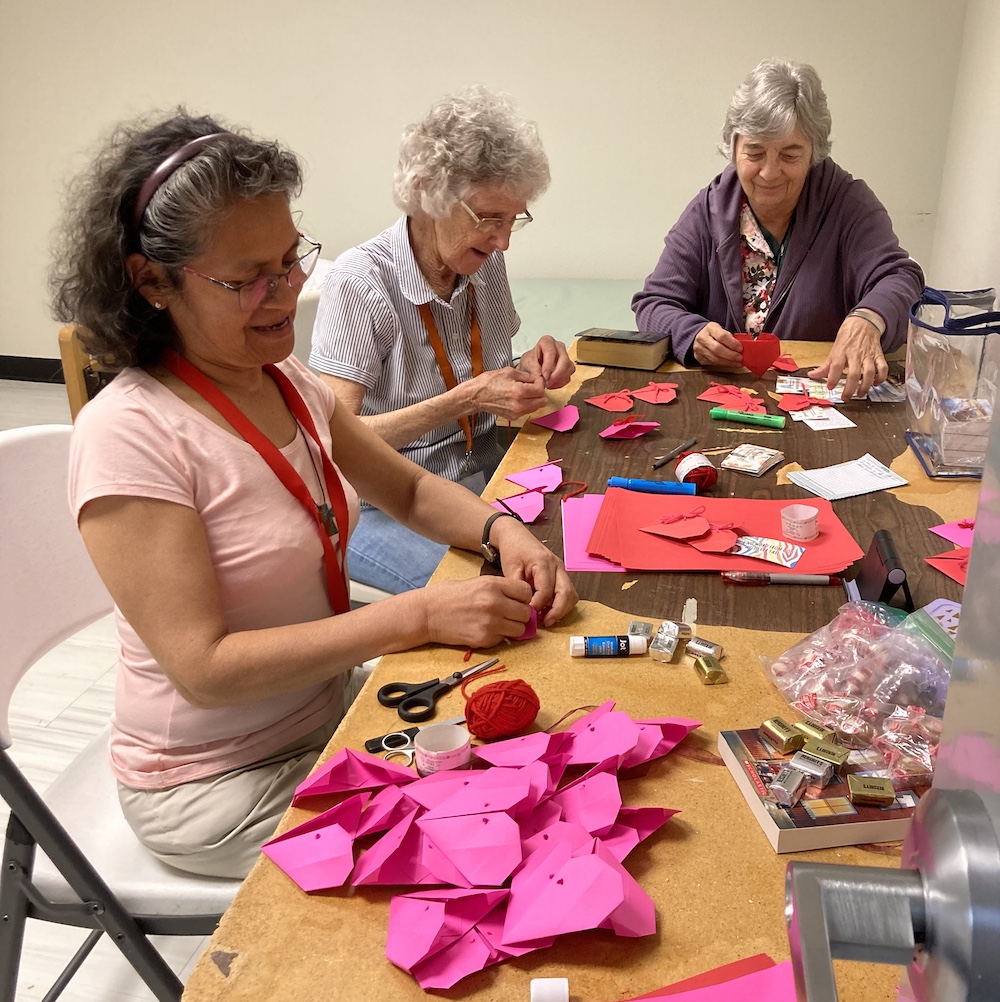
From left: Srs. Yuli Oncihuay and Kathy Neely, both Ursuline Sisters of Louisville, Kentucky, and Carol Reamer, an Ursuline Sister of Toledo, Ohio, make Mother's Day gifts for the guests of Annunciation House in El Paso, Texas. The three sisters lived and worked together for decades in Peru and volunteered together for a monthlong mission at the U.S.-Mexico border. (Courtesy of the Ursuline Sisters of Louisville)
One of our activities included preparing a small gift (paper hearts, a prayer and candy) for all the mothers for Mother's Day. Each mother also received a rose from one of the young male volunteers who also works in a floral shop.
The intercession in our daily prayer book spoke loudly as we finished our week and a half of service: "Give joy to those who minister in homeless shelters, through charitable agencies, and on the streets."
The three of us have heard stories from families of their horrific journey, the pain of separations for months, and the hardships they have endured, but we have also heard the joy of the children as they are playing. We have seen the smiles of the mothers and fathers, and this is our joy: to be able to do our small part to help our sisters and brothers feel welcome in our home.

